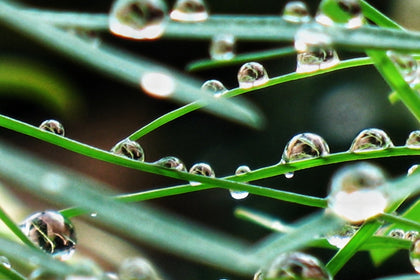Castor oil … You’ve probably seen dozens of articles and Pinterest posts suggesting you rub the thick natural substance into your scalp, brows or lashes for incredible growth. But can a single ingredient really be the magical that will help you achieve total hair wellness?
Castor oil is a thick, viscous oil derived from the castor bean (which is technically not a bean at all; it’s a seed!). Just like many other seeds and nuts, the castor bean is full of fatty acids so it can be pressed to produce oil. It’s a very unique oil — there’s no doubt about that. It is the only oil that is primarily composed of ricinoleic acid, a type of unsaturated fatty acid with a variety of properties, including a unique skin-feel and some interesting physiological effects. Plus, find out what products you should really be using to get thicker, fuller looking hair.
#include-related-slider#
So What’s the Castor Oil Obsession All About?
Before we get deep into it, it’s important to give castor oil credit where it’s due: As with many other oils, it’s an emollient that can help keep moisture in the skin so it has its cosmetic uses in moisturizers and lip balms.
However, there are many claims about it that are quite suspect, especially when it comes to castor oil for hair. The big claim is that castor oil can help the brows, lashes and head hair to grow at lightning speed, but the explanations as to why are all over the place.
The most common one is that it’s anti-inflammatory, which seems to be partially true, though when it comes to hair growth things are a little more complicated. While anti-inflammatories can help with inflammation-induced hair problems, it’s actually pretty rare that it’s the ONLY reason for hair loss or damage for most people. This alone indicates castor oil isn’t some miracle ingredient that can do it all.
Other sources suggest that castor oil helps with hair growth because it’s an antifungal or antibacterial agent. Occasionally, sources will say that castor oil helps because it contains antioxidants, because it balances the scalp’s pH, or that it stimulates the hair follicle. There is no science that definitely proves these things are true.
Clinically-Proven Ingredients: Try GRO Hair Serum
So Does Castor Oil for Hair Actually Work?
Now that you understand what the claims about castor oil are, let’s examine them, starting with the most untenable claims: While castor oil does contain antioxidants, which can be nice for protecting the hair, the truth is that it doesn’t contain more antioxidants than other botanical oils or extracts, not to mention that antioxidants have a better impact on the hair when consumed, so supplementing with them would be much more effective.
Next is the suggestion that it can balance the scalp’s pH, when the truth is that fatty acids bound in oil are not water-soluble so they can’t influence pH at all. Finally, the question of stimulation is also suspect, although it is possible that just by massaging the oil into the scalp stimulation is improved.
The anti-inflammatory effects of castor oil are the most intriguing, but when follicular inflammation is the reason for hair damage or loss, it’s important that the anti-inflammatory topical ingredient can actually penetrate into the follicles. Since castor oil is fairly heavy and thick, it doesn’t penetrate well, so while its anti-inflammatory effect might be okay if the skin is chafed (and one isn’t sensitive to it), it isn’t likely to reach the hair follicles where inflammation could be an issue. It’d be better to choose micro-encapsulated soothing ingredients that can actually get into the follicle to take action.
Next, let’s talk about the antibacterial and antifungal claims, with which we have a few issues. First, most of the research backing up these claims wasn’t done on castor oil at all, but on extracts from the castor leaf which have a totally different chemical composition.
Additionally, fungi and bacteria are rarely the causes of hair loss, and while infection may sometimes cause eyelash loss, it is nowhere close to being a common reason for it. If infection is the reason for hair damage loss, it is better to use proven antimicrobial agents, rather than an oil with limited evidence. Finally, as an “anti-fungal” castor oil is often recommended for those suffering from dandruff or seborrheic dermatitis, but this is actually highly problematic. The fungus that causes those skin conditions actually feeds on the lipids in oils, so applying it can worsen the condition.
The hard-hitting fact is that when placed under scientific scrutiny, there is zero research to show that castor oil helps with hair growth. All the anecdotal experiences likely have more to do with the placebo effect or the simple benefits of moisturization.
Also: Surprising Beauty Benefits of Marula Oil
Other Problems With Castor Oil
Beyond the fact that castor oil isn’t the magical remedy it is said to be, it is also not a great cosmetic ingredient, at least not when applied directly to the skin or hair at full strength.
Learn: What Causes Hair Loss and How to Fix It
It’s Irritating and Drying
Castor oil is a very astringent oil, and as a result it can be irritating to skin. There are a few case studies of humans developing contact dermatitis after applying castor oil to their skin, and no shortage of online accounts of castor oil irritating the skin, leading to dryness, sensitivity, and even loss of hair, which is the exact opposite of what you want it to do! It can be even more dangerous when applied to the delicate area around the eyes. The issues with castor oil usually come from using it at full strength, so it’s usually safe when diluted.
It’s Sticky and Clingy
Castor oil is extremely viscous, which is a slightly more pleasant way of saying that it’s thick and sticky. This makes it extremely unpleasant to use, especially on the lashes but also on the scalp. Once applied it can be very difficult to remove, and it can make the scalp feel greasy. This would be minor if castor oil was as miraculous as claimed, but since its effects are not proven, it’s just not worth it. Additionally, the sticky nature of this oil can even wreak havoc by making the hair tangle more easily, and in some instances it can even cause serious hair matting, to the point where the hair cannot be untangled and must be cut off.
Find Out: How to Get Thicker Looking Hair
It’s Dangerous If Eaten
While the advice for using castor oil for hair growth is for topical application, accidentally consuming it is going to be very unpleasant since it is a strong laxative that can cause diarrhea. Consuming massive amounts of castor oil could be legitimately dangerous, especially to children and animals who are likelier to accidentally eat things they shouldn’t.
Boost Your Growth: Biotin Gummies for Hair
Natural Products That Actually Help With Hair Growth
So we’ve explained why we don’t think castor oil is a great remedy for hair growth, which probably leaves you wondering what natural ingredients will in fact help your hair.
Let’s start with ingredients that work similarly to how castor oil is supposed to work: anti-inflammatories. When the hair follicles are soothed they are in a better position to keep making hair, but there are plenty of anti-inflammatory natural compounds that are a lot more pleasant to use than castor oil.
Beyond this, we also prefer ingredients that have been proven to help with hair growth through well-understood mechanisms, like red clover extract which is featured in GRO Hair Serum. Adding a hair serum to encourage thicker, fuller looking hair is one of the easiest ways to maximize your hair routine.
So the bottom line is that if castor oil doesn’t irritate your skin you don’t need to stay away from it in your cosmetics, but just know it’s not the miraculous hair remedy that everyone on the internet seems to claim. There are plenty of natural alternatives that are more pleasant to use and will actually give you those luscious locks.
More From VEGAMOUR
Back


















